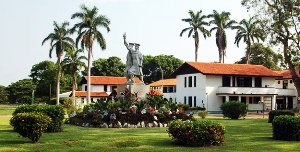- Home - News
- Elections 2024
- News Archive
- Crime & Punishment
- Politics
- Regional
- Editorial
- Health
- Ghanaians Abroad
- Tabloid
- Africa
- Religion
- Photo Archives
- Press Release
General News of Wednesday, 2 April 2025
Source: www.ghanawebbers.com
POS Foundation Leads Sexual Harassment Conversation on varsity campuses
**University of Ghana - Legon**
A large majority—80%—of sexual harassment cases at the University of Ghana involve students. This data shows that most incidents are student-on-student rather than faculty-related.
Mabel Sowatey is a faculty member in the Sociology Department. She also serves on UG’s Anti-Sexual Harassment Committee. She shared these insights during a focus group meeting at UG, organized by POS Foundation and the Student Representative Council Women’s Commission.
Ms. Sowatey described various forms of harassment. These include unsolicited advances, persistent propositions, inappropriate gestures, and excessive attention like love letters. Other forms include hooting, whispering, sending explicit photos, assault, and rape.
She stressed the importance of reporting harassment to university authorities and police. Some offenses, like rape, are criminal acts. “Consent must be freely given,” she stated. “Students cannot engage in relationships with lecturers.” She encouraged anyone experiencing harassment to report it.
UG is committed to addressing sexual harassment through functioning CCTV systems and improved resolution mechanisms. “We do not want harassment to disrupt a student’s education,” Sowatey said. “Let your ‘no’ be an affirmative no.”
She acknowledged false reporting can occur but emphasized thorough investigations before action is taken.
**Campaign to Raise Awareness**
Jonathan Osei Owusu is the Founder and Executive Director of POS Foundation. He explained that their campaign aims to raise awareness about sexual harassment on campuses. The goal is to protect students’ rights and create a safe academic environment.
Owusu highlighted that sexual harassment affects students, faculty, and staff globally. Many Ghanaian universities have anti-harassment policies but struggle with implementation due to poor reporting channels and slow responses.
“The National Accreditation Board has provided guidelines for developing effective policies,” he noted. However, there remains a gap between policy and practice. Many students face stigma when reporting incidents, while authorities often show apathy towards these cases.
He advised students against making disrespectful gestures or comments towards their peers.
**Addressing the Issues**
The focus group meeting aimed to educate stakeholders about sexual harassment's forms and consequences. It also reviewed existing policies for alignment with international standards.
Additionally, it assessed current reporting mechanisms for complaints about harassment. The initiative seeks first-hand insights to refine policies and train administrators on prevention strategies.
As part of this effort, POS Foundation will hold one-day seminars at five universities: KNUST, UCC, UG, UEW, and UDS. These seminars will educate students and faculty while evaluating current policies for improvement.
Entertainment










